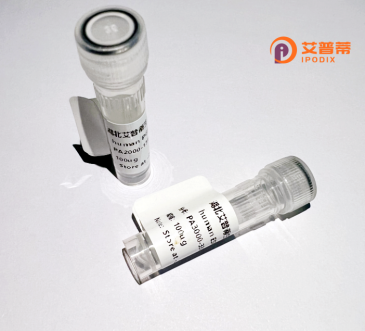
| 纯度 | >90%SDS-PAGE. |
| 种属 | Human |
| 靶点 | KDM5B |
| Uniprot No | Q9UGL1 |
| 内毒素 | < 0.01EU/μg |
| 表达宿主 | E.coli |
| 表达区间 | 2-751aa |
| 活性数据 | EAATTLHPGPRPALPLGGPGPLGEFLPPPECPVFEPSWEEFADPFAFIHK IRPIAEQTGICKVRPPPDWQPPFACDVDKLHFTPRIQRLNELEAQTRVKL NFLDQIAKYWELQGSTLKIPHVERKILDLFQLNKLVAEEGGFAVVCKDRK WTKIATKMGFAPGKAVGSHIRGHYERILNPYNLFLSGDSLRCLQKPNLTT DTKDKEYKPHDIPQRQSVQPSETCPPARRAKRMRAEAMNIKIEPEETTEA RTHNLRRRMGCPTPKCENEKEMKSSIKQEPIERKDYIVENEKEKPKSRSK KATNAVDLYVCLLCGSGNDEDRLLLCDGCDDSYHTFCLIPPLHDVPKGDW RCPKCLAQECSKPQEAFGFEQAARDYTLRTFGEMADAFKSDYFNMPVHMV PTELVEKEFWRLVSTIEEDVTVEYGADIASKEFGSGFPVRDGKIKLSPEE EEYLDSGWNLNNMPVMEQSVLAHITADICGMKLPWLYVGMCFSSFCWHIE DHWSYSINYLHWGEPKTWYGVPGYAAEQLENVMKKLAPELFVSQPDLLHQ LVTIMNPNTLMTHEVPVYRTNQCAGEFVITFPRAYHSGFNQGFNFAEAVN FCTVDWLPLGRQCVEHYRLLHRYCVFSHDEMICKMASKADVLDVVVASTV QKDMAIMIEDEKALRETVRKLGVIDSERMDFELLPDDERQCVKCKTTCFM SAISCSCKPGLLVCLHHVKELCSCPPYKYKLRYRYTLDDLYPMMNALKLR |
| 分子量 | 88 kDa |
| 蛋白标签 | GST-tag at N-terminal |
| 缓冲液 | 0 |
| 稳定性 & 储存条件 | Lyophilized protein should be stored at ≤ -20°C, stable for one year after receipt. Reconstituted protein solution can be stored at 2-8°C for 2-7 days. Aliquots of reconstituted samples are stable at ≤ -20°C for 3 months. |
| 复溶 | Always centrifuge tubes before opening.Do not mix by vortex or pipetting. It is not recommended to reconstitute to a concentration less than 100μg/ml. Dissolve the lyophilized protein in distilled water. Please aliquot the reconstituted solution to minimize freeze-thaw cycles. |
1. **"Structural basis for histone demethylation by the KDM5B histone demethylase"** by Aik, W. et al.
*摘要*:该研究解析了重组人KDM5B蛋白与底物类似物结合的晶体结构,阐明其催化去甲基化反应的分子机制,揭示其依赖Fe²⁺和α-酮戊二酸作为辅因子的特性。
2. **"KDM5B regulates embryonic stem cell self-renewal and somatic cell reprogramming"** by Wang, J. et al.
*摘要*:通过重组KDM5B蛋白实验,证实其通过调控H3K4me3表观修饰,影响干细胞的自我更新能力及体细胞重编程效率,并提出其在多能性维持中的作用。
3. **"Development of a high-throughput assay for screening KDM5B inhibitors"** by Horton, J.R. et al.
*摘要*:利用重组KDM5B蛋白建立基于荧光信号的酶活检测方法,用于高通量筛选靶向该去甲基化酶的抗癌药物候选分子,验证其抑制剂的作用效果。
4. **"Role of KDM5B in DNA repair and cancer progression"** by Teng, Y.C. et al.
*摘要*:研究发现重组KDM5B蛋白通过调控H3K4me3修饰介导的染色质重塑,促进DNA损伤修复通路激活,并与乳腺癌耐药性及转移相关。
Recombinant human KDM5B protein, also known as JARID1B or PLU1. is a histone demethylase that plays a critical role in epigenetic regulation. It belongs to the KDM5/JARID1 subfamily of lysine-specific demethylases, which specifically target di- and tri-methylated lysine 4 on histone H3 (H3K4me2/me3), key epigenetic marks associated with transcriptional activation. By erasing these methylation signals, KDM5B modulates chromatin structure and gene expression, influencing processes such as cell differentiation, proliferation, and DNA repair.
KDM5B has garnered significant attention in cancer research due to its dual role as both a tumor suppressor and promoter, depending on cellular context. Overexpression of KDM5B is linked to tumor progression, drug resistance, and poor prognosis in cancers like breast cancer, melanoma, and leukemia. Its ability to silence tumor suppressor genes or maintain cancer stem cell plasticity underscores its therapeutic relevance. Recombinant KDM5B protein, typically produced in *E. coli* or mammalian expression systems, retains enzymatic activity and is widely used *in vitro* to study demethylation mechanisms, screen inhibitors, and explore chromatin remodeling.
Structurally, KDM5B contains conserved domains, including JmjN, JmjC (catalytic domain), PHD zinc fingers, and a BRIGHT domain, which mediate substrate recognition and protein interactions. Research tools like recombinant KDM5B facilitate the development of targeted epigenetic therapies aiming to restore dysregulated gene expression in diseases.
×